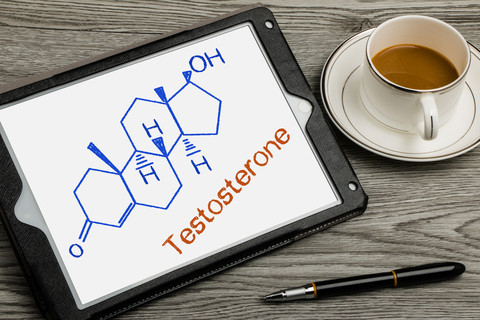Long time readers will know that I tend to investigate limerence as a physiological phenomenon – what interests me most is how the altered mental state of limerence emerges from the functioning of the neural systems of the brain. Psychology and physiology are often treated as separate disciplines, but clearly must be inextricably linked.
While I’ve covered many of the neurochemical principles, there is an aspect of physiology that is undeniably important to love and lust that I haven’t really addressed before – testosterone.

It seems obvious that testosterone must be involved in limerence at some level. Many limerents experience an increase in libido during the early phases of infatuation, and a marked erotic desire for LO, even if this isn’t the principal cause of attraction. Some limerents report a generalised increase in libido that can rejuvenate a flagging sex life as a consequence of succumbing to limerence. There can even be a very close association, where libido drops as limerence wanes, prompting a loss of sexual interest.
As we all know, testosterone is linked to libido, and that explains why men are generally more sexually motivated than women. So, it follows logically that testosterone could peak during the early period of limerence, causing the uptick in libido and meaning that increased T is an aspect of the “altered state”.
As this aspect of physiology is a bit beyond my own expertise, I spent a while poring through the literature to see how much evidence there was for this theory. Turned out to be quite the wake-up call.

Sex hormones and human physiology
The first complicating factor is that testosterone, like much in physiology, has multiple roles. Testosterone isn’t just a “feeling horny” hormone, it also drives aggression, competitiveness, motivation, muscle mass, bone density, and various other physical and behavioural changes. Even more importantly, it is a developmental cue that has major influence on body composition and development of secondary sexual characteristics at key points in life – from within the womb to puberty.
The next complication is that there is natural variation in the circulating levels of testosterone within populations of men and women. For women in particular, the relative levels of sex hormone vary during the menstrual cycle. Another confound is that testosterone can be converted into the “feminising” hormone oestrogen by an enzyme known as aromatase – the activity of which also varies between individuals. So high T might also lead to high oestrogen.
So, basically, before we even start on trying to understand how testosterone may impact on limerence, we know for sure that it has done loads of things over many years to differing extents that are unique to each individual. Not what you would call a “stable baseline”.
What do we know?
Perhaps the simplest way to try and understand the influence of testosterone on libido is to measure the levels of testosterone in people exposed to various erotic stimuli or situations, or to administer testosterone to people as a drug and see what happens to their sex drive.
If you get people into a lab and monitor the levels of testosterone in their saliva after encouraging them to think sexy thoughts (or watch sexy imagery), there is an increase in testosterone in most subjects. Similarly, if you administer testosterone and then ask people to think erotic thoughts, there is an increase in both reported levels of sexual arousal and blood flow to the… key organs.

However, the best description of these changes is that they are variable, inconsistent and small. Given the wide range of confounding factors in both T level and sexual arousal, the uncertain influence of short-term, minor changes in testosterone levels is trivial.
Testosterone isn’t a volume control for libido.
So why do we think T = libido?
I’d say there are two major reasons why the idea that testosterone drives libido has become received wisdom. The first is that there is an undeniable difference in the average levels of T between men and women, and a similar difference in the average sex drive for single men and women (especially in young adulthood).
Don’t misunderstand me – this isn’t fate, or biological destiny, or predictive for any individual person in all their unique splendour – this is population-level statistics. If you sample a load of men and a load of women, the men score higher on average for frequency of sexual thoughts, frequency of masturbation, and motivational drive to secure a sexual partner.
The second major cause of this belief is the impact of overt defects in testosterone production. Hypogonadism (little or no testosterone production) leads to minimal sexual desire or drive. Hypergonadism (overproduction of testosterone) leads to increased libido in men, among many other problems. For women, it seems more to cause a disruption of menstrual cycle – perhaps because aromatase is busy turning T into oestrogen.
So, the importance of testosterone for libido is revealed by the extreme cases of disease or dysfunction – it is clearly required for a normal libido to be present.
However, for most healthy people, their natural “resting” levels of testosterone are clearly sufficient to maintain whatever intrinsic libido they have. Adding more testosterone doesn’t have much of an impact – in the jargon, it isn’t a limiting factor.
Testosterone and mood
A final point – really, the elephant in the room of all of this biology – is the importance of mood for libido. There are lots of influences on how sexy we feel. Psychology is a massive part of eroticism. Accordingly, it won’t matter how much T is sloshing around if you just aren’t in the right mindset for sexy fun times.
Even worse, testosterone is linked to mood in men. Weirdly, both low and high testosterone correlate with depression, revealing yet again how messy hormones are.
The last thing to note, before drawing a veil over this untidy discussion, is that testosterone levels also correlate with relationship status. For both men and women, testosterone is higher when single (and searching for a mate) or in the early stages of a new relationship, than when comfortably settled in a long-term relationship.
It does at least seem that whatever competitive, libidinous, mate-seeking drive testosterone promotes begins to wane as a pair-bond forms.
So, to sum up: it’s a complicated story. The best summary I can manage is: as long as you are not suffering from a gonadal dysfunction of some sort, testosterone is only one, minor, complicated factor in the amalgam of forces that influence limerent desire.
When it comes to individual libido, it seems that absolute testosterone level is a minor factor, as long as you are otherwise healthy.
Still, on the bright side, at least the unsatisfying conclusion means I don’t have to delve back into that particular research quagmire again!

“The first complicating factor is that testosterone, like much in physiology, has multiple roles. Testosterone isn’t just a “feeling horny” hormone, it also drives aggression, competitiveness, motivation, muscle mass, bone density, and various other physical and behavioural changes.”
Thank you for writing this article, Dr. L. I have always wanted to understand what makes me tick as a biological male, and testosterone is (an evidently very confusing and complicated) part of the story!! I have never really been aggressive. I’m more artistic by temperament. Never really liked sport or shows of physical strength. However, I have always been super-competitive, and I guess competitiveness could rightly be viewed as a sublimated form of aggression?
I am interested in how my hormones may have shaped my lifelong experience of limerence. I seem to have developed limerent feelings for the first time at 13, right on schedule, just after going through a relatively early puberty (compared to my male peers, who didn’t really catch up with me until they were around 15-16).
Throughout my teens, my limerent attractions seem to fluctuate in terms of choice of object. Sometimes, I thought I wanted a female mate. Sometimes, I thought I wanted a male mate. In my late teens, my brain become increasingly stuck on other males – the worst-case scenario pretty much for any lovesick teenaged boy, because the odds of reciprocation were so abysmally low!! 😉
By the time I reached late adolescence, of course, pretty much all the young men in my social circle were actively seeking girlfriends. Basically, I found myself locked out of the conventional world of dating and marriage, due to my … ahem … “unconventional tastes” … and intensely lonely as a result).
I am now on the cusp on 40, and my limerent feelings are at the lowest levels they’ve been in my entire adult life since they started. I actually feel I’m physically (as well as psychologically) “aging out of the mating game forever”, and I wonder if dropping testosterone levels have had a hand in that?
Put another way, I feel like I’ve “lost my competitive edge” in the romance arena. I don’t want to play ball if there’s no chance of winning. I’m competitive, not delusional. On the bright side, I no longer suffer terrible self-consciousness around gorgeous male peers. Pair-bonding no longer feels like a super-high-priority activity to me. I guess I’ve lived four decades without forming a pair-bond, and managed to survive. Singleness is not the end of the world. 🤔😆
I am quite happy to have a “dad bod” now, and the same apparently “depressed” levels of male hormones as men in committed relationships. I am unfortunately way less competitive than I used to be in work. However, my less-competitive mindset allows me to adopt a more nurturing attitude to people who are younger than me. I.e. I almost feel like “it’s someone else’s turn to shine now”.
So, um, dropping testosterone levels = mixed blessing for the spiritually-minded? 😛
I am a married 50 yo F. I’ve commented very rarely on this site but followed it on and off for years and it has been immensely helpful even as I have struggled to extricate myself from a LE that’s gone on seemingly forever. It is my first and only LE, came on out of nowhere in my mid 40s, and has had at times many of the marks of an EA. But it’s a bizarre attraction because though the person is to me kind, attractive and fun, he’s also unstable, has demanded money, and has other bad qualities which would seem to instantly disqualify him from romantic consideration. Anyway to the point. The limerant romantic feelings are tightly tied with my menstrual cycle, which of course is also going haywire as I get older. In the first part of the cycle they increase to the point of nearly driving me nuts. Toward my period they decline to the point where I ask myself why on earth did I ever let this bum anywhere near me and how can I get rid of him? And then the cycle repeats. I don’t know if testosterone is the salient hormone here but there’s something chemical going on and I’ve discerned that for a long time. Thanks to Dr. L and this site for shedding light on this disturbing and difficult condition. Without the reassurances that this is in fact a neuro-chemical state, common to many people and the source of a lot of confusion and grief, I might be in big trouble by now.
There is a stage during peri-menopause when, as the body struggles to ovulate, it produces higher levels of ovulation triggering hormones (oestrogen, progesterone, can’t recall which) to make it happen. Many women report increased libido at various points during peri-menopause and this is one of the causes.
Same here !
Female 40+
Best wishes to you!
Same here = “nuts”/ limerent during first part of the female cycle, then indifferent, realistic and “over LO”in the second part.
But then the limerence starts again and again and…. and I’m in limerence (with the same LO) for years now….
Just in case it’s of any help to your research, Dr L, I have been undergoing Leuprorelin injections for the last year (because of prostate cancer) and my body is therefore not producing Testosterone.
I have been limerent for a neighbour for some three years, however, and this painful infatuation has not dimmed despite two months of no contact.
Hi, question… so which starts first ? The testosterone causes the Limerence, or the Limerence causes larger release of testosterone? I’m little confused.
This can’t apply to me. In terms of T mine must be pretty constant. (M) DIY twice a day or more now over 50 and Limerence hit me hard and fast for the first time this summer. So how did that work?